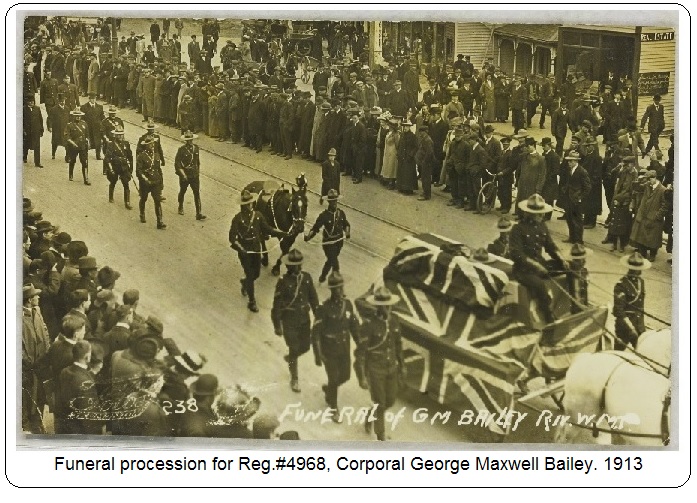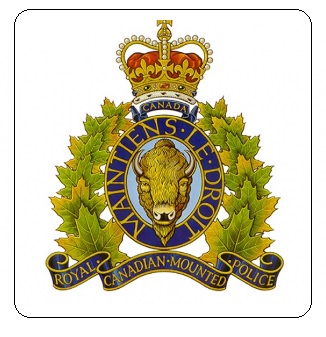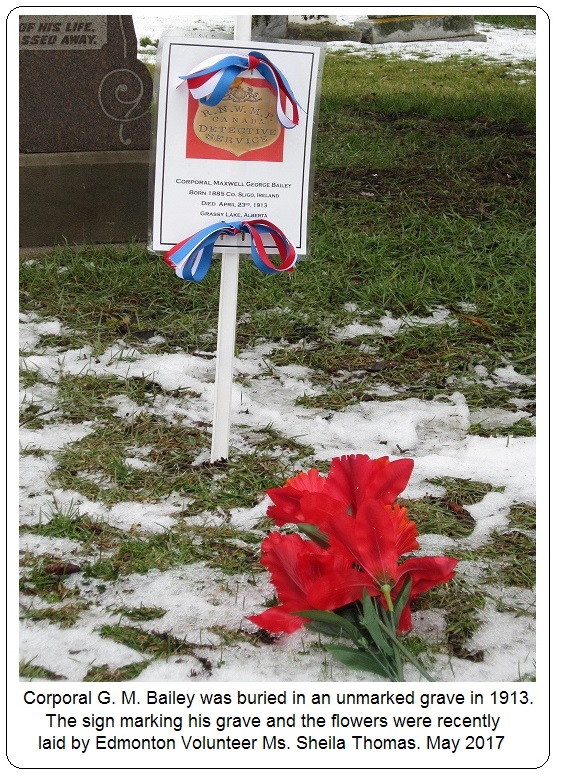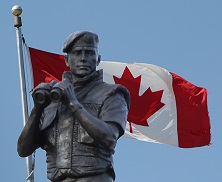True and Fascinating Canadian History

Vet of the Month: April, 2017
Reg.#4968, Corporal Maxwell George Bailey
Honour Roll #39
RCMP Vets. Ottawa, ON
The following story might well be a reminder to all police officers about the unexpected twists and turns in law enforcement and the frequency of violence which can arise in the daily duties of a police officer. The story also highlights the importance of good education and training for police officers and the preparatory steps that should be taken for the care of patients experiencing mental illness.
The arrest, care and custody of patients suffering mental illness falls into a special category of law enforcement, and the police officer must be aware and alert to the possibility of violence. I recall an unpleasant incident which happened to me one afternoon in late August, 1969.
Around supper time, I was on patrol alone in my police cruiser in Ridge Meadows, BC when I was asked to return to the Detachment to see the Duty Sergeant. He handed me a Form 7 Warrant of Committal and told me to drive to a particular address, and to arrest a man and deliver him to the Essondale Hospital for a psychiatric examination. The man's wife had complained earlier that her husband had acted strangely and she and the children feared that he might harm them possibly as they slept.

Up to that point at other times and places, I had accompanied other RCMP members when patients had to be arrested and taken to the hospital. In these previous cases, each arrest was frightening for everyone involved -- the patient, the patient's family and children, the RCMP constables, as well as nearby neighbours and witnesses.
From the patient's perspective, the appearance of a police officer at their door spells arrest and confinement in a strange place, and in many cases the patient will refuse to accompany the police officer to the hospital. If the first encounter between the patient and the constable is not handled carefully, violence can often be expected.
In those days, I had not received any special training in the management of people with mental problems -- and much like my constable friends, it was a case of not knowing exactly what to do except resort to physical force when the need arose. On the one hand, my instincts and personal values told me there had to be a better way to handle patients, yet on the other hand, if the situation became overly heated one easily resorted to physical force especially after lengthy coaxing of the patient simply failed.

On this particular August afternoon, the assignment seemed simple enough. The Sergeant led me to believe that the patient was a professional person who lived in the Sergeant's neighbourhood, and the man was harmless and that he would be compliant to my request for an escort to the hospital for treatment. But, upon arrival at the address, I was immediately met at the door with resistance then violence which resulted in a full blown brawl and struggle between the patient and me on the floor in the dining room of the man's house.
To worsen the situation, the fight took place in front of the man's spouse and their children. After a lengthy struggle, it took all my strength to finally overcome the man's resistance and safely half drag and carry him to the cruiser and deliver him to the psychiatric mental hospital in Coquitlam, BC. Neither the Sergeant or I had expected the man to react in such a violent manner towards me. The incident left an everlasting unfavourable impression on me. I would have preferred that the outcome was different and that it had been a peaceful event. Today, due to better training of police officers and new knowledge of people with mental illness, the same situation would have been handled quite differently. Experts in the realm of mental health and other resources are available to assist the police officer in their encounters with patients with mental illness.
Many years ago, a similar but much more serious occurrence involved a male patient and Corporal George Bailey.

In mid April 1913, Cpl. Bailey was accompanied by Reg.#5288 Constable Reginal Tetley, Reg.#5393 Constable Lambertus Stad, and Reg.#5535 Constable Samuel Whitley. The foursome went to a house in Grassy Lake, AB to arrest Oscar Fonberg on a Warrant of Committal issued by the Court as a result of Fonberg shooting at neighbours.
As the RCMP team approached the house, Fonberg began shooting. Corporal Bailey was killed instantly and both Constable Stad and Constable Whitley were wounded. At the same time, Constable Tetley managed to shield the wounded constables and then he was able to call for additional help.
More RCMP quickly arrived but Fonberg had escaped into the surrounding woods. Meanwhile, Reg.#4893, Sgt. Louis Holbrook was riding his horse to the murder scene when he met a farmer with a horse and wagon. Sgt. Holbrook found that the wounded Fonberg was also riding in the wagon.
Fonberg offered no resistance and he was arrested by Sergeant Holbrook. Later at trial, Fonberg was sentenced to life imprisonment for the murder of Corporal Bailey.
On that April day, Corporal Bailey sacrificed his life in the attempt to arrest Fonberg. It is quite probable that the RCMP team led by Corporal Bailey never expected Fonberg to react with such violence which resulted in the death of Corporal Bailey.
What can be learned from the Corporal Bailey tragedy? Detachment guidelines should contain policies and procedures and they should be in place in all police agencies in order to inform and support the work of individual police officers as well as all police personnel who might encounter people with mental illness. If a patient has to be arrested at their home, it might be advisable for the police officer to wear plain clothes so that the patient's anxiety is not nessarily increased.
And finally, each police organization must also be guided by the knowledge taught at the Police Academy so that recruits carry, transfer and share new ideas and concepts about patients with mental illness directly into the entire police environment.
Reporting from Fort Healy,
J. J. Healy
April 23, 2017

This short piece has been written in memory of Corporal George Maxwell Bailey. A new Memorial Marker has been ordered for Corporal Bailey's grave and it will be in place in 2017.
Honour Roll #39





